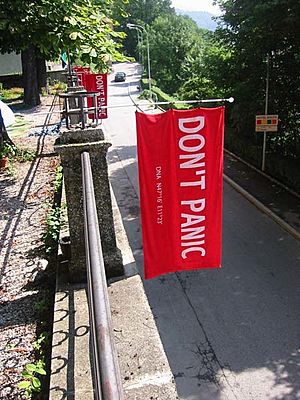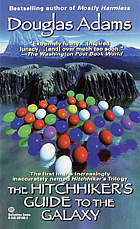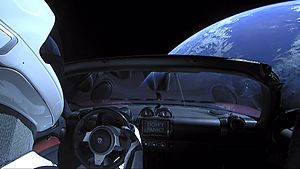Phrases from The Hitchhiker's Guide to the Galaxy facts for kids
The Hitchhiker's Guide to the Galaxy is a funny science fiction series. It was created by Douglas Adams. Many people love it, including scientists! Phrases from the series are very famous. People often use them even when they are not talking about the books. Many writers who explain science, like Fred Alan Wolf and Michio Kaku, use quotes from the series. They use them to help explain facts about the universe or big ideas about life.
| Top - 0-9 A B C D E F G H I J K L M N O P Q R S T U V W X Y Z |
The Answer to the Ultimate Question of Life, the Universe, and Everything is 42
In the radio show and first book, some super-smart beings wanted to know the Answer to the Ultimate Question of Life, The Universe, and Everything. They built a huge computer called Deep Thought just for this.
It took Deep Thought seven and a half million years to figure out the answer. The answer was 42. Deep Thought then said the answer seemed meaningless. This was because the beings who asked the question never knew what the actual question was!
When asked to find the Ultimate Question, Deep Thought said it couldn't. But it could help design an even more powerful computer. This new computer would use living beings as part of its "brain." It would run for ten million years. This computer turned out to be the planet Earth itself! The super-smart beings took the form of white lab mice to watch it work.
The process was stopped after eight million years. This happened when the Golgafrinchans unexpectedly arrived on Earth. Then, the whole plan was ruined completely. This happened five minutes before the computer finished its work. The Vogons destroyed Earth. They said it was to build a new hyperspace bypass. But in another book, it was revealed this was a trick. Psychiatrists had hired the Vogons to destroy Earth. They were afraid they would lose their jobs if the Ultimate Question became known.
Since they didn't have the real question, the mice decided not to start over. Instead, they just picked a random question: "How many roads must a man walk down?" This is a line from a Bob Dylan song.
Later, Arthur Dent might have part of the Earth computer's "brain" in his own mind. He tried to find the Ultimate Question from his brainwave patterns. When playing Scrabble, a caveman spelled out "forty two." Arthur then pulled random letters from a bag. He got the sentence: "What do you get if you multiply six by nine?"
"Six by nine. Forty two."
"That's it. That's all there is."
"I always thought something was fundamentally wrong with the universe."
Six times nine is actually fifty-four. The answer 42 is wrong for that question. This is because the question itself was miscalculated. The Earth computer program should have worked correctly. But the unexpected arrival of the Golgafrinchans on prehistoric Earth caused errors. This led to the wrong question being computed. So, the question in Arthur's mind was never correct.
Douglas Adams once joked about a theory. It says if anyone finds out why the Universe exists, it will disappear. Then, something even stranger will take its place. Another theory says this has already happened!
Some readers found a hidden meaning in the numbers. They noticed that 6 × 9 = 54 in our normal number system. But if you use base-13, 54 is written as 42. So, 610 × 910 = 4213. When asked about this, Douglas Adams said it was just a coincidence. He said he doesn't write jokes using different number systems.
In the book Life, the Universe and Everything, a character named "Prak" knows everything true. He confirms that 42 is indeed The Answer. He also says that The Answer and The Question cannot be known in the same universe. If they are, they will cancel each other out. This would destroy the Universe, replacing it with something stranger. Even though the question is never found, 42 is the table number where Arthur and his friends sit at Milliways. This happens at the end of the radio series. Also, Mostly Harmless ends with Arthur stopping at street number 42.
Why the number 42?
Douglas Adams was asked many times why he chose the number 42. Many ideas were suggested. Some thought it was because 42 is 101010 in binary code. Others thought it was about how light bends in water to make a rainbow. Adams said all these ideas were wrong.
On November 3, 1993, he gave a simple answer online:
The answer to this is very simple. It was a joke. It had to be a number, an ordinary, smallish number, and I chose that one. Binary representations, base thirteen, Tibetan monks are all complete nonsense. I sat at my desk, stared into the garden and thought '42 will do' I typed it out. End of story.
Adams called 42 "a completely ordinary number." He said it was a number you could "introduce to your parents" without any fear.
Adams later explained more in an interview. He said he needed an "ordinary number." He remembered working for John Cleese on training videos. Cleese needed a "funny number" for a joke. Adams believed Cleese used 42, and he decided to use it too.
Stephen Fry, a friend of Adams, says Adams told him the real reason for 42. Fry says it is "fascinating, extraordinary and, when you think hard about it, completely obvious." But Fry has promised not to tell anyone the secret.
The number 42 also appears often in the books of Lewis Carroll. Some people think this might have influenced Adams. They point out that Alice's math in Alice's Adventures in Wonderland goes wrong at 4 x 13. This is similar to the "six by nine" problem in Hitchhiker's.
Some people also guess that 42 is Adams' tribute to paperback books. They say it's the average number of lines on a page. Another idea is that 42 refers to the number of laws in cricket, which is a sport mentioned in the books.
42 Puzzle
The 42 Puzzle is a game Douglas Adams created in 1994. It was for the US versions of The Hitchhiker's Guide to the Galaxy books. The puzzle is a picture with 42 colorful balls. They are in 7 columns and 6 rows. Douglas Adams said:
Everybody was looking for hidden meanings and puzzles and significances in what I had written (like 'is it significant that 6×9 = 42 in base 13?' As if.) So I thought that just for a change I would actually construct a puzzle and see how many people solved it. Of course, nobody paid it any attention. I think that's terribly significant.
In this puzzle, the question is unknown, but the answer is already known to be 42. This is like the book, where the "Answer to the Ultimate Question of Life, the Universe, and Everything" is known, but not the question. The puzzle first appeared in The Illustrated Hitchhiker's Guide to the Galaxy. It was later put on the covers of all five reprinted "Hitchhiker's" novels in the United States.
Adams said the puzzle shows the number 42 in ten different ways. Here are six possible questions:
- (1) How many spheres are in the picture? (six rows of seven is 42)
- (2) What position in the grid does the Earth occupy? (42)
- (3) One of the spheres has a barcode that shows the number 42.
- (4) If red-colored balls are '1' and others are '0', what number does each row make in binary? (Each row reads '0101010', which is '42' in our normal numbers.)
- (5) What number do the blue-colored balls spell out? (Like a color blindness test.) (42)
- (6) What number do the yellow-colored balls in the first three rows spell out using Roman numerals? (XLII = 42)
On the Internet and in software
The number 42 and the phrase "Life, the universe, and everything" are very popular online. "Life, the universe, and everything" is often used for off-topic sections on internet forums. It means "anything at all." Many chatbots will answer "42" if you ask them about the meaning of life.
Some online calculators also know the answer. Google Calculator will give 42 for "the answer to life the universe and everything." So will Wolfram's Computational Knowledge Engine and DuckDuckGo. In the online game Second Life, there's a place called "42nd Life." It's all about this idea from the books.
In OpenOffice.org software (older versions), if you type "=ANTWORT("Das Leben, das Universum und der ganze Rest")" into a spreadsheet cell, the answer is 42. This is German for "=ANSWER("life, the universe and everything")".
The standard for TIFF images uses 42 as a version number. It says this number "has never changed, and probably never will." It was chosen for its "deep philosophical significance."
The starting number (random seed) for creating the universe in the online game EVE Online was chosen as 42. In the game Gothic, "42" is a code that turns off all cheats. After typing "42", the game asks, "What was the question?" The OpenSUSE team even named a version of their software "Leap 42" as a reference to the answer to life, the universe and everything.
Don't Panic
In the series, "Don't Panic" is written on the cover of The Hitchhiker's Guide to the Galaxy book. The story explains this was partly because the guide looked very complicated to use. It was also to help intergalactic travelers stay calm. The book says that even with its mistakes, the Hitchhiker's Guide sold more than the Encyclopedia Galactica. This is because it was cheaper and had "DON'T PANIC" in big, friendly letters on the cover.
The famous writer Arthur C. Clarke said Douglas Adams' use of "don't panic" was perhaps the best advice for humanity.
On February 6, 2018, SpaceX launched its Falcon Heavy rocket. It carried Elon Musk's Tesla Roadster. The car's dashboard screen showed "DON'T PANIC!" This was a clear nod to the book series.
Knowing where one's towel is

Someone who can handle almost any situation is said to "know where their towel is." The reason for this idea is explained in chapter 3 of The Hitchhiker's Guide to the Galaxy:
... a towel has immense psychological value. For some reason, if a strag (strag: nonhitchhiker) discovers that a hitchhiker has his towel with him, he will automatically assume that he is also in possession of a toothbrush, washcloth, soap, tin of biscuits, flask, compass, map, ball of string, gnat spray, wet-weather gear, space suit etc., etc. Furthermore, the strag will then happily lend the hitchhiker any of these or a dozen other items that the hitchhiker might accidentally have "lost". What the strag will think is that any man who can hitch the length and breadth of the galaxy, rough it, slum it, struggle against terrible odds, win through, and still knows where his towel is, is clearly a man to be reckoned with.
Douglas Adams got this idea when he was traveling and kept losing his beach towel. In The Hitchhiker's Guide to the Galaxy -The Radio Scripts, his friends said he would always "mislay" his towel. On Towel Day, fans celebrate Adams by carrying towels with them.
Mostly Harmless
The only information about Earth in the Guide used to be "Harmless." But Ford Prefect managed to change it a little before he got stuck on Earth. When Arthur Dent heard "Mostly Harmless," he was very upset. Those two words were not what Ford had written. It was all that was left after the editors changed his work.
The phrase is the title of the fifth book in the Hitchhiker series. It is so popular that it has become the definition of Earth in many science fiction reference books. Also, "Harmless" and "Mostly Harmless" are ranks in the computer game Elite and its sequels. In World of Warcraft, there is a rifle that fires (mostly) harmless pellets. In the game RuneScape, there is an island called Mos Le Harmless (Mostly Harmless). Players with low scores in Perfect Dark and GoldenEye 007 are called "mostly harmless." In the board game Cosmic Encounter, humans are given the attribute "Mostly Harmless." In the game Kerbal Space Program, an atomic rocket motor is described as "mostly harmless."
Not entirely unlike
In chapter 17 of the first Hitchhiker's Guide book, Arthur Dent tries to get a Nutrimatic drinks machine to make him a cup of tea. Instead, it always makes a strange drink. Most people found it unpleasant. It was described as "almost, but not quite, entirely unlike tea."
In the computer game based on the book, one of the player's main goals, as Arthur Dent, is to trick the machine and find some good tea. The game constantly reminds the player of this with an item called "no tea" in their inventory. This phrase has even become part of computer slang.
"Share and Enjoy" is the slogan of the Sirius Cybernetics Corporation Complaints Division. In the radio version, this phrase had its own song. A choir of robots sang it during "special occasions." The Sirius Cybernetics Corporation often makes faulty products. This makes the slogan ironic, as few people would want to "Share and Enjoy" something that doesn't work.
One design flaw is that the robot choir sings the song out of tune. The Guide says the words "Share and Enjoy" were once displayed in huge, lit-up letters. They were three miles high near the Complaints Division. But their weight caused them to crash through the offices below. The top half of the sign that is still visible now means "Go stick your head in a pig" in the local language. It only lights up for special parties.
The "Share and Enjoy" tune is also used in the TV series. It's the background music for a robot commercial. The slogan for the robot is: "Your plastic pal who's fun to be with!"
So Long, and Thanks for All the Fish
After mice, the second smartest animals on Earth were the dolphins.
The dolphins had long known of the impending demolition of Earth and had made many attempts to alert mankind to the danger...The last ever dolphins message was misinterpreted as a surprisingly sophisticated attempt to do a double backward somersault through a hoop whilst whistling "The Star-Spangled Banner," but in fact the message was this: "So Long, and Thanks for All the Fish."
—Douglas Adams, The Hitchhiker's Guide to the Galaxy
This line was also the title of the fourth book in the series. In that book, it appears as a message written on crystal bowls. These bowls were left as gifts from the dolphins to humans before they left Earth. The phrase became very popular. It was even the title of the opening song for The Hitchhiker's Guide to the Galaxy movie.
The band NOFX spoofed the phrase for their album So Long, and Thanks for All the Shoes. A Perfect Circle also has a song with this title on their 2018 album. At their concerts, they dedicated this song to people who "knew where their towels are." The music video for the song even shows flying dolphins, just like in Hitchhiker's Guide.
Images for kids
 | DeHart Hubbard |
 | Wilma Rudolph |
 | Jesse Owens |
 | Jackie Joyner-Kersee |
 | Major Taylor |





